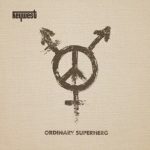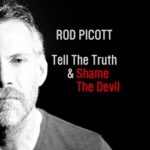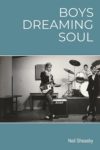 It’s fair to say that the music scene in the Irish Republic has always been distinct from that in the UK. It’s not uncommon for bands to be massive, having Number One hits in Ireland while being unknown in the UK and that’ s the way it is with Keywest. They’ve had two Number One albums in Ireland already and now they’re out to conquer the UK with their first album release here, “Ordinary Superhero”. It’s fair to say that in (fairly) recent years, bands taking this route have been aimed at the teen market and the pop charts; while Keywest have some radio-friendly tunes, there’s a lot more to this outfit than pop songs.
It’s fair to say that the music scene in the Irish Republic has always been distinct from that in the UK. It’s not uncommon for bands to be massive, having Number One hits in Ireland while being unknown in the UK and that’ s the way it is with Keywest. They’ve had two Number One albums in Ireland already and now they’re out to conquer the UK with their first album release here, “Ordinary Superhero”. It’s fair to say that in (fairly) recent years, bands taking this route have been aimed at the teen market and the pop charts; while Keywest have some radio-friendly tunes, there’s a lot more to this outfit than pop songs.
They got together busking in Ireland, honing their craft in front of a constantly changing audience on the streets; it’s a harsh learning environment, but the survivors have to be good and they have to know how to hold an audience. I’ve seen Keywest live a couple of times and I know for sure that they’ve achieved both of those goals. It was a live performance in Camden in 2018 that led Steve Tannett, head of Marshall Records to sign them to the label in the UK.
“Ordinary Superhero” is a pretty good representation of where the band is at the moment. They’ve taken all the lessons learned from playing to audiences whose attention they had to grab instantly and created ten songs that fuse influences from pop, folk, rock, Celtic traditional and world music rhythms. The arrangements are built around big choruses and an effective use of dynamics with some Edge-style guitar parts (U2 had to get in there somehow) and emotive Andy Glover vocals, creating a wide soundscape with constant variations.
If you’re looking for standout songs, the floor tom-driven opener “Somebody to Love” with Big Country (or maybe Bryan Adams) guitar hooks is right up there. The title song praises mothers bringing up families in dire social conditions; it’s about an Irish mother, but the message is universal. “This is Heartbreak” features a standout vocal performance, pulling out every nuance of the immediate impact of a broken relationship perfectly.
Just one more thing. The album’s packed with great songs and performances, but it’s not the best way to get the Keywest experience. To get the best from Keywest, you need to see them live. They’re touring the UK in October to promote the album and the live experience is just something else.
“Ordinary Superhero” is released in the UK on Friday September 27th on Marshall Records (CD – R910.022, Vinyl – R920.009).
 A new Rod Picott album is always something to look forward to. He’s an exceptional songwriter and his voice is a very effective vehicle for delivering those songs. It’s a voice that’s frayed around the edges and at times crackles with emotion. On “Tell the Truth and Shame the Devil”, Rod has stripped his delivery back to just guitar, harmonica and voice; oh, and the songs. Just to give this some context, the album was recorded after a health scare Rod had over the last winter (although not all of the songs are contemporary) and has a stark, sometimes brooding, feel mingled, unsurprisingly, with intimations of mortality, including the opening song “Ghost”, a brutally honest assessment of Rod’s current situation, and that of many others in similar positions. Confessional, hard-hitting singer-songwriter isn’t a particularly lucrative career path these days.
A new Rod Picott album is always something to look forward to. He’s an exceptional songwriter and his voice is a very effective vehicle for delivering those songs. It’s a voice that’s frayed around the edges and at times crackles with emotion. On “Tell the Truth and Shame the Devil”, Rod has stripped his delivery back to just guitar, harmonica and voice; oh, and the songs. Just to give this some context, the album was recorded after a health scare Rod had over the last winter (although not all of the songs are contemporary) and has a stark, sometimes brooding, feel mingled, unsurprisingly, with intimations of mortality, including the opening song “Ghost”, a brutally honest assessment of Rod’s current situation, and that of many others in similar positions. Confessional, hard-hitting singer-songwriter isn’t a particularly lucrative career path these days.
Rod recorded the entire album alone, without an engineer, before handing the tapes over to Neilson Hubbard (you might remember him if you’re a MusicRiot regular) for final production. If you want a benchmark, the finished article has the same feel as The Boss’s “Nebraska” and has similar lyrical themes of family, poverty and alienation. The result of this method is that the songs are stripped to their very essence with no distractions, emphasising the stories they have to tell and, as always with Rod Picott, they’re striking and memorable stories.
As a writer, Rod likes a metaphor; the murder ballad “Too Much Rain” uses a barren landscape to represent the failure of a marriage to blossom, while “Bailing” uses the idea of bailing literally and metaphorically, referring back to a flooded childhood cellar as a metaphor for the futility of activity that only serves to keep us in the same place. Rod also likes to bring a bit of autobiography into the mix; “Mark” is the story of an unexplained teenage suicide, while “Spartan Hotel” is that bar in any town where anything goes if you can pay the price. And don’t forget the social comment; “A Beautiful Light” aims straight the heart of those songwriters who try to glamourise the drudgery of blue-collar life as a means of social control.
This is the third Rod Picott album we’ve reviewed here and they’re consistently powerful pieces of work blending punchy stories of small-time America with haunting melodies in a voice that is both emotive and vulnerable. It’s probably the most personal of his recent albums and well worth a listen.
“Tell the Truth and Shame the Devil” is out now Welding Rod Records and Rod will be touring the UK in October.
 Imagine a story that starts with a fanatical Jam fan in the town of Atherstone who draws pictures of the band’s album covers in his exercise books during lessons at school and fantasises about being in his own band. Imagine that kid forty years later turning to his right at Islington Assembly Hall and seeing Paul Weller making a guest appearance with the band, Stone Foundation, that the kid has played with and believed in for a huge chunk of his life. Now that would make a great story, wouldn’t it? Bloody right it would, especially when the kid is Neil Sheasby, known to fans of Stone Foundation for his gritty on-the-road diaries spilling all the gory details (and the pleasant surprises and triumphs) of life in a band in the 21st century.
Imagine a story that starts with a fanatical Jam fan in the town of Atherstone who draws pictures of the band’s album covers in his exercise books during lessons at school and fantasises about being in his own band. Imagine that kid forty years later turning to his right at Islington Assembly Hall and seeing Paul Weller making a guest appearance with the band, Stone Foundation, that the kid has played with and believed in for a huge chunk of his life. Now that would make a great story, wouldn’t it? Bloody right it would, especially when the kid is Neil Sheasby, known to fans of Stone Foundation for his gritty on-the-road diaries spilling all the gory details (and the pleasant surprises and triumphs) of life in a band in the 21st century.
Brother Sheas (as Paul Weller refers to him) is a natural storyteller, who’s never short of an opinion and has the knack of pacing the narrative perfectly, in a style that captures perfectly his spoken delivery and with an ability to deliver the killer punchline when it’s needed. I’m not going to spoil the book for you by retelling the stories – I mean, the whole point of this is to make you want to buy it and read it. The only spoiler I’m going with is that the story stops short of the formation of Stone Foundation (which I’m guessing will come with the second volume).
The story “Boys Dreaming Soul” tells is of passion for music, passion for the right clothes, riotous times and bad behaviour, life in a small working-class town (and I can relate to most of those) and a lifelong friendship that comes to define both of the people involved. Neil’s deadpan delivery is perfect for the music business anecdotes, but he’s equally effective with the serious business, and there’s a fair amount of that as well.
This book will make you laugh; it might make you cry. If you’re interested in music at all, and why are reading this if you aren’t, you’ll be fascinated by Neil’s stories of his various bands and nights out at music industry schmoozefests and the memories he evokes with playlists for each chapter of the book (Neil loves a playlist). He’s a very engaging author and he’s created a compelling memoir in “Boys Dreaming Soul”. It’s a story of complete commitment to an ideal whether times are good or bad, happy or sad. And it made me realise we were at the same gig in Nottingham thirty years ago.
It’s available at the main online stores but why not try here first. It’s out now.


